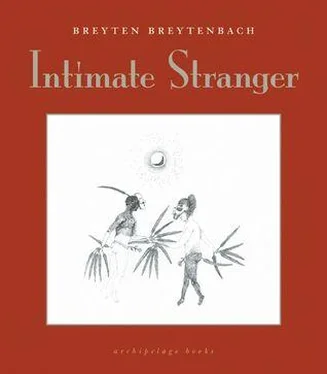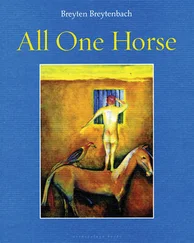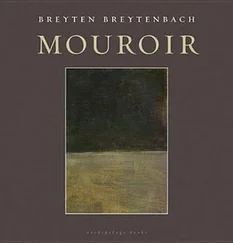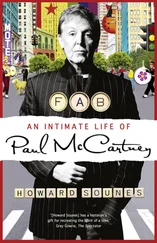How do we write such a summer? What is writing? Maybe life is the answer. Life happens (“while you’re crossing the street,” as the songwriter said).
I must not proceed too quickly. So much gets left behind, perhaps forever. Allow me to return. I remember a scene from Tarifa. 15,000 ‘illegals’ from Africa had been intercepted last year. Now on this bright summer morning 33 more had been caught in one roundup, the majority of them young women. When asked where they’re from, in several languages (each person crossing the Straits like the soul crossing River Styx to the other shore where nightingales sing, destroys her or his identity papers so as not to be returned to the country of origin), they smile very sweetly but do not answer. Then, as if hearkening some invisible signal, they all start singing a very sad song to the bewildered Guardia Civil. Was this a spontaneous recognition of identity? Are they appealing to a shared humanity? Or do they believe they can in this way ‘put a spell’ on the miscreant but powerful whites? Later, I visited the piece of land where the many who wash up drowned are buried. Ah, to die nameless and be hidden away in some no man’s land where the bones as are shadows! The gravestones are anonymous, bearing just a date and a serial number.
Still later, in a few years’ time, it will become nearly impossible to cross the Straits. Then thousands of desperate would-be emigrants from Sub-Saharan Africa will throw themselves on the barbed enclosures around the Spanish enclaves of Ceuta and Melilla in Morocco, try to scale these barriers using rudimentary ladders made in the forest, believing that if they could only make it onto Spanish soil they’d be allowed into Europe, and cut themselves to ribbons, and get shot. And later still tens of thousands will flock to Nouadhibou in Mauritania, having walked and hitched from Senegal and Mali and Guinea and Guinea-Bissau and Gambia and Sierra Leone and Nigeria, and pay a minimum of 150,000 ouguiyas each to a passeur (about 500 euros), they’ll live like animals under rudimentary shelters while waiting to embark on a crude cayuco for the Canary Islands. The embarkations will be smashed on reefs and treacherous shores or turn turtle on the high seas; the clandestine passengers will drown; when they wash up somewhere they will be put in the earth anonymously.
Writing remains the surfacing of a sense of being alive, of living and experiencing the only ‘world’ we know — which is life. Wanting to change it too. Being petrified, sometimes, by the cracks in the sidewalk and the slips and slopes of the mind. Frustrated by the restrictions and exhilarated by the challenges and the unforeseen discoveries of ‘surfacing.’ In that sense then, writing is always against death, obliteration, extinction and non-writing. But writing is also a way of situating yourself in the one world we inhabit.
In The Witness of Poetry , Milosz remarks: “Through the mass media poets of all languages receive information on what is occurring across the surface of the whole earth, on the tortures inflicted by man on man, on starvation, misery, humiliation. At one time when their knowledge of reality was limited to one village or district, poets had no such burden to bear. Is it surprising that they are always morally indignant, that they feel responsible, that no promise of the further triumphs of science and technology can veil these images of chaos and human folly? And when they try to visualize the near future, they find nothing there except the probability of economic crisis and war?”
I’m not suggesting for a moment that you ought to be writing about ‘the big issues.’ Your only authority (and authorship) lies after all in exercising and presenting consciousness located by the experiences and apprehensions of your own heart-mind. From the effort at extending consciousness — through invention, imagination, structure, detail, texture — a conscience about the implications and perhaps even the imperatives of being alive at a particular time among specific people may or may not flow. This exercise need not be universal to be effective; it can be personal, private and apparently intimate. It will, however, imply a choice of position and approach. The writer can, I think, through her words and images and characters and stories, transmit and translate many of the tensions we live with. The writer is giving voice to the inchoate and the incoherent, even when only in an idiosyncratic and partial way. That voice is not an antidote to violence and madness and idiocy, but it may help us turn around and see the terror as also the beauty.
Is a story a slice of life, a raw slab of meat on the counter still seeping blood that can be equated with words? Or is it a construct consisting of condensations and cadences, patterns and artifacts that will give it the verisimilitude and veneer of life and the slightly metallic odor of blood? Must the ‘imitation’ exercise choices of ellipses and repetitions, shifts and breaks, in order to be like the ‘original’? Isn’t awareness brought to the surface of self-telling already the establishment of a text? Is it at all possible for reflection to present itself other than as narrative? Do we not, the moment we stop to think about ‘life,’ fictionalize ourselves irredeemably? I suspect we do. In fact, I don’t imagine one can locate and identify ‘self’ except through narrating, and thus at least partly inventing it to the self. And as you mark, so you rub out. That is why I prefer to talk of the fiction of self .
On the other hand, can we propose that life is (only) a story? We tend to assume that a story is less determinate and more innocuous than life. Is this true? Robert Alter, in a discussion of Nabokov’s novel Invitation to a Beheading , saw the author’s crucial point as: “it is life rather than art alone that is inexhaustible, and that art’s ability to renew itself, to be infinitely various and captivating, finally depends on its necessary inadequacy in the face of the inexhaustible enigma of conscious life.” Of course, the story of life is larger than the story of words, but we can only appropriate the first (if such should be our goal) by means of the second, by endorsing their twinness. And look at how extensively we inflect our lives by the narrative structuring of our daily existence, exactly as we’d do in fiction through plotting, directing, anticipating character development!
The word-web we spin is as close to life as a hide — hide as in skin, but also as a place of dissimulation and protection. The process of apprehending life (imitating it, recreating it) through telling must surely correspond to the very profound human urge and need to visualize, imagine, project, direct or re-direct, disarm, obfuscate, empower, delete, escape, exorcize, destroy even.
To move and be moved. By re-living and re-inventing we hope to take the fear out of the unknown and break down the unacceptable.
Where do these deep impulses originate? It must be survival instinct, but also the visceral need to go beyond our limitations. Projecting ourselves beyond our limits is a survival strategy, even though we know it to be foolish and that there can be no prolongation or birth on the other side of demise. Those will remain unwritten pages. In the meantime, we understand ourselves in terms of what we want to be. Perhaps we know all things — and then the telling, the creation of beauty and the allaying of fears will be ways of dissimulating the fact that we have already come to terms with the mysterious absurdity of our mortality and /or the modalities of our immortality, which includes effacement and dissolution of the self.
Maybe, at heart, we are at ease with the untold! Are we just going through the motions, Reader? With such passion?
Читать дальше












